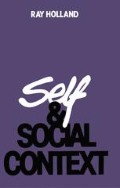Abstract
One’s first impression on looking at the field of personality theories is of a great range and variety of contending approaches. And yet on closer examination there are certain basic themes which arise in different theories; like the concept of a ‘natural’ or ‘true’ self which struggles to emerge against all the pressures and distorting influences of a social environment, or Freud’s discoveries which appear in a number of different guises. Thus it is possible, and may be useful, to explore personality theories at the level of these themes in addition to whatever work may go on by way of specific empirical testing of particular theories. This approach is especially relevant in a study which, while respecting the necessary autonomy of the disciplines of psychology and sociology, is designed to raise questions about the relation between them and the possibilities and needs for interdisciplinary study. Personality theories are attempts to construct knowledge of a particularly significant kind—knowledge of what it is to be a human being, with all that this entails in terms of a formative social context—and this makes it imperative to call upon a predominantly sociological method of appraisal which derives from the sociology of knowledge, as well as a careful psychological assessment of the theories.
Preview
Unable to display preview. Download preview PDF.
Notes and References
M. Merleau-Ponty. Phenomenology of Perception, Routledge, London (1962), p 179
ibid., p. 179
ibid., p. 179
W. H. N. Hotopf. Language, Thought and Comprehension, Routledge, London (1965)
G. W. Allport. Becoming. Yale University Press, New Haven, Conn., and London (1955), p. 18
C. S. Hall and G. Lindzey. Theories of Personality, John Wiley, New York and Chichester (1957)
E. Devons and M. Gluckman. Closed Systems and Open Minds (ed. M. Gluckman), Oliver & Boyd, Edinburgh (1964)
J. R. Ravetz. Scientific Knowledge and its Social Problems. Clarendon, University Press, Oxford (1971)
E. Devons and M. Gluckman. Closed Systems and Open Minds (ed. M. Gluckman), Oliver & Boyd, Edinburgh (1964), p. 261
M. Mulkay. Some aspects of cultural growth in the natural sciences. Soc. Res., 36, 1 (1969), 22–52
J. Ben-David. Roles and innovations in medicine. Am. J. Sociol., 65 (1960), 557–68
G. A. Kelly. The Psychology of Personal Constructs, Norton, New York (1955)
H. J. S. Guntrip. Psychoanalytic Theory, Therapy and the Self, Hogarth, London (1971)
R. D. Laing and A. Esterson. Sanity, Madness and the Family, Tavistock, London (1964) R. D. Laing and D. G. Cooper. Reason and Violence, Tavistock, London (1964)
L. Althusser and E. Balibar. Reading ‘Capital’, New Left Books, London (1970)
A. Wilden. The Language of the Self, Johns Hopkins, Baltimore, Md. (1968)
The effort to understand and propagate phenomenological approaches has produced innumerable conferences and publications dominated by an exegesis of Husserl.
J. J. Dagenais. Models of Man, Nijhoff, The Hague (1972), p. 147
P. Winch. The Idea of a Social Science, Routledge, London (1958), p. 102
J. M. Hems. Husserl and/or Wittgenstein. Int. Philos. Q. 8 (1968), 547–78
P. Winch. The Idea of a Social Science, Routledge, London (1958), p. 102
J. J. Dagenais. Models of Man, Nijhoff, The Hague (1972), p. 153
ibid., p. XI
Copyright information
© 1977 Ray Holland
About this chapter
Cite this chapter
Holland, R. (1977). Introduction. In: Self and Social Context. Palgrave, London. https://doi.org/10.1007/978-1-349-15789-1_1
Download citation
DOI: https://doi.org/10.1007/978-1-349-15789-1_1
Publisher Name: Palgrave, London
Print ISBN: 978-0-333-19812-4
Online ISBN: 978-1-349-15789-1
eBook Packages: Palgrave Religion & Philosophy CollectionPhilosophy and Religion (R0)

